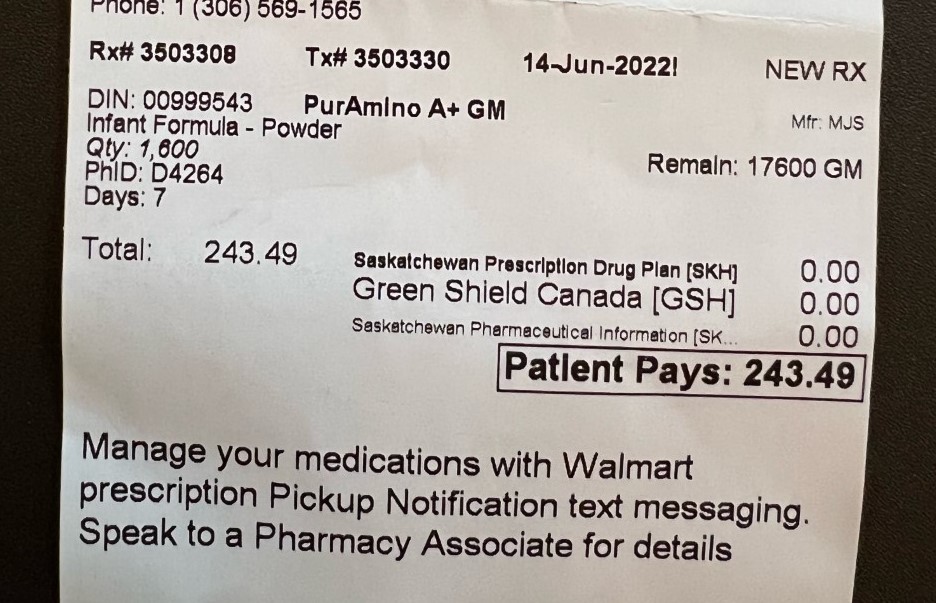Dominique Millman says her family has had to make cutbacks to their grocery bill and other expenses because their infant daughter requires a specialized formula.

That formula, Enfamil Puramino A+ Hypoallergenic, comes at a cost of $57 to $64 for 400 grams which lasts about three days. Monthly, the family is shelling out about $750 for their baby’s milk substitute.
Despite having a prescription for the formula, the family says they don’t have coverage through the government or their insurance company to foot the bill.
The formula is for children with severe allergies to cow’s milk protein, or other conditions.
When Millman’s daughter Walker was born in January 2022, the family decided to feed her a basic formula due to previous experiences with breastfeeding that led to postpartum depression and stress.
Millman started noticing a decline in Walker’s health, and at one point she had a fever of 104.
Millman took her baby the emergency room in Estevan, Sask. After multiple tests, Walker went into septic shock and was taken to Regina’s pediatric intensive care unit. Walker was in hospital for a week before she was able to go home.
A dietician recommended a different type of formula, but due to the formula shortage, Millman wasn’t able to get her hands on it.
Millman got Enfamil Puramino A+ Hypoallergenic as an alternative, which the family’s dietician and pediatrician said would work.
“It’s been working really great for our daughter,” Millman said.
Millman said before switching to the new formula, Walker would throw up “all the time” and was “very miserable.”

Get weekly health news
Now, Millman said she’s basically a new baby.
“It’s a miracle, but it comes with a price.”
With the family paying $750 a month for formula – which amounts to half of their rent – Millman said the money has to come from somewhere.
“It definitely does discourage us knowing that there’s some parents who can get away with paying $19 for a can of formula that lasts longer than three days,” Millman said.
Enfamil Puramino A+ Hypoallergenic formula is available at retailers like Walmart, Amazon and London Drugs but the Millman family uses a prescription to access the formula because the formula shortage made retail supply unreliable.
“It’s more so I’m not reaching out on Facebook like I had previously because we only had enough food to feed her for eight days.”
Despite the prescription for the costly formula, the family doesn’t have coverage through Saskatchewan’s drug plan or their personal insurance company, Green Shield Canada.
“We have this prescription and it’s basically only to ensure that we can feed our daughter. At this point, it doesn’t do anything for us financially.”
Global News reached out to Green Shield Canada but did not receive a response before deadline.
Millman said Green Shield Canada has said they aren’t able to change the plan until the next benefit year, but they will try to include it next year.
The family has also tried to access government coverage through SAIL, or Saskatchewan Aids to Independent Living, but say they don’t meet income criteria.
A spokesperson with Saskatchewan’s health ministry said it reviews programs frequently “to improve patient-centred care in a cost-sustainable manner.”
They said the SAIL programs “in general do not have a set income limit as an eligibility criteria.”

The spokesperson added the Therapeutic Nutritional Products Program (TNPP) provides help with the cost of specialized nutritional products for individuals with complex medical needs, when those products are “their primary source of nutrition.”
“TNPP assists with the incremental cost associated with using these products in place of a regular diet. These costs are shared between patients and Saskatchewan Health, with the patient’s portion varying based on a number of factors including family income.”
The spokesperson said other factors may include how many children are in the family, additional prescription drug costs, and the costs of the approved products that are covered by TNPP.
Families may request a reassessment of their coverage at any time, the ministry said.
Millman said she was unaware of TNPP but will be applying to it.
To save money, the family has had to make some sacrifices. That includes changing their cell phone plan, cutting back on the amount of driving, making a strict grocery list and starting meal planning and prepping.
The family had originally hoped to take trips starting this summer and to head to Mexico in the winter – trips Millman says likely won’t happen this year.
“I’ve never lived on a budget like this before, but if I have to do it for her to eat, I do,” Millman said.
Millman said she wants to share her family’s story so people understand the formula shortage is real.
“When you have a medically complex child, regardless of your income, it is so mentally, physically and financially draining.”
For families struggling to find formula that meets their child’s needs, Millman urges them to reach out to a dietician or pediatrician to get a prescription.










Comments
Want to discuss? Please read our Commenting Policy first.